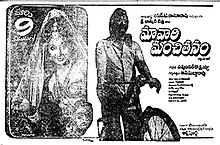| This article needs a plot summary. Please add one in your own words. (January 2022) (Learn how and when to remove this message) |
1979 Indian film
| Maavari Manchitanam | |
|---|---|
 Theatrical release poster Theatrical release poster | |
| Directed by | B. A. Subba Rao |
| Written by | Gollapudi (dialogues) |
| Screenplay by | B. A. Subba Rao |
| Story by | Nihar Ranjan Gupta |
| Based on | Do Anjaane |
| Produced by | A. Pundarikakshaiah |
| Starring | N. T. Rama Rao Vanisri |
| Cinematography | M. A. Rehman |
| Edited by | Kandaswamy |
| Music by | Master Venu |
| Production company | Sri Bhaskara Chitra |
| Release date |
|
| Country | India |
| Language | Telugu |
Maavari Manchitanam (transl. My Husband's Goodness) is a 1979 Indian Telugu-language drama film, produced by A. Pundarikakshaiah and directed by B. A. Subba Rao. It stars N. T. Rama Rao and Vanisri, with music composed by Master Venu. The film is a remake of the Hindi film Do Anjaane (1976), itself based on the novel Ratrir Yatri by Nihar Ranjan Gupta.
Plot
The film begins in Bombay, where Naresh Dutt, the son of a tycoon, Sumesh Dutt, meets an accident. To which he recoups himself as Amit. At that point, Sumesh divulges that 6 years ago, they found him on railway tracks in an amnesia state. So, Sumesh's couple adopted him with the title of their deceased son Naresh. Amit currently spins his past, which is that of a bourgeois clerk at Calcutta. Once, he views a dance of pretty Rekha and walks with the proposal. Rekha is rapacious, imagining an opulent lifestyle. Anyhow, by force & class of her parents, she unwillingly splices Amit. She is vexatious and constantly nags him, which quietly endures. Time passes, and the couple is blessed with a baby boy, Mithun, but Rekha still holds her sumptuous mindset. Meanwhile, Amit comes across his childhood well-off mate Ranjit, who attempts to lure Rekha with his status & comfort, and she reciprocates. So, Amit becomes an alcoholic, and his only silver lining is Mithun. Ranjit reorganizes Rekha's dance consorts, molding her into a film star. Amit denies it, and Rekha talks cheaply about his livelihood when a rift arises. Ranjit pretends to be a cool-off, and they all proceed to Bombay. Midway, he attempts to throw him off the train, causing an accident. Amit seeks vengeance and sets foot in Calcutta, where Rekha is today's cinema icon, Sunita Devi. Ergo, disguised as a film producer, Naresh re-enters Rekha's life. Here, Rekha & Ranjit are astonished & suspicious since Amit narrates & picturizes their own life story. Plus, he is associated with his son Mithun, now 10, whom Rekha neglects joining in boarding school. Mithun detects his father and is on cloud nine. Following, Amit breaks out Ranjit's hellish hue and penalizes him. Then, it turns to Rekha, who moves away with Mithun by expelling her. Rekha implores Amit not to do so and to accompany her, too. However, he refuses because Mithun detests her and marches to Bombay. At last, Amit returns to retrieve Rekha after his parents convince him, and Mithun accepts her. Finally, the movie ends happily.
Cast
- N. T. Rama Rao
- Vanisri
- Jaggayya
- Gummadi
- Padmanabham
- Nutan Prasad
- Ramana Murthy
- Chaya Devi
- Pushpalatha
- Baby Rohini
Soundtrack
| Maavari Manchitanam | |
|---|---|
| Film score by Master Venu | |
| Released | 1979 |
| Genre | Soundtrack |
| Producer | Master Venu |
Music composed by Master Venu. Lyrics were written by C. Narayana Reddy.
| S. No. | Song Title | Singers | length |
|---|---|---|---|
| 1 | "Enthakaina Taginavadavera" | P. Susheela | |
| 2 | "Mee Manchitanaaniki" | S. P. Balasubrahmanyam, P. Susheela | |
| 3 | "Chenchita Vedale Vetaku" | V. Ramakrishna, P. Susheela, Anand, Kovela Shantha | |
| 4 | "Kanna Kanna" | S. P. Balasubrahmanyam | |
| 5 | "Yadanunchi Vundi Padado" | P. Susheela | |
| 6 | "Amma Donga" | S. P. Balasubrahmanyam, S. P. Sailaja |
References
- "సీనియర్ ఎన్టీఆర్ రీమేక్ చేసిన అమితాబ్ బచ్చన్ సూపర్ హిట్ సినిమాలు ఇవే." News18 (in Telugu). 8 May 2020. Archived from the original on 15 January 2021. Retrieved 13 January 2021.
- Gupta, Ranjan Das (8 October 2010). "Rekha breaks her silence". The Hindu. Archived from the original on 5 May 2018. Retrieved 25 December 2020.